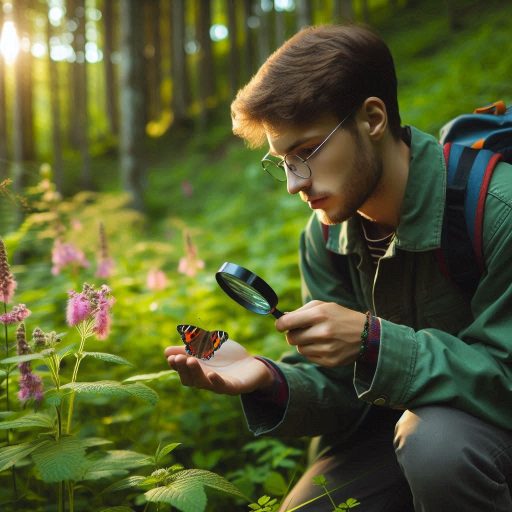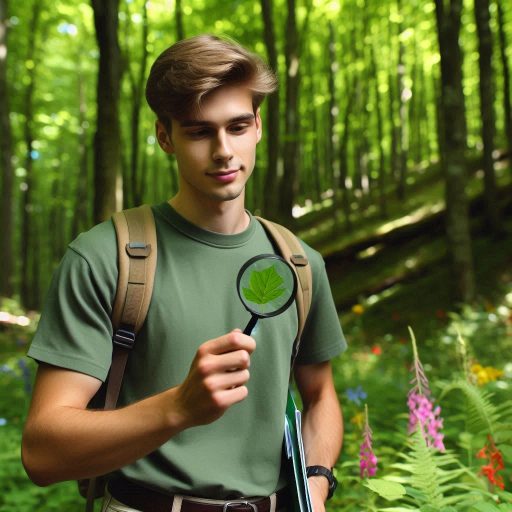Introduction
Ecology is the study of interactions between organisms and their environment.
It encompasses various levels, from individual species to entire ecosystems.
Understanding these relationships helps us recognize the impact of human activities on the natural world.
As habitats face threats from climate change, pollution, and urbanization, conservation efforts become crucial.
Protecting biodiversity ensures the survival of ecosystems, which provide essential services like clean air and water.
Conservation aims to preserve our planet‘s wildlife and natural resources.
It focuses on maintaining healthy ecosystems and preventing species extinction.
By safeguarding biodiversity, we enhance ecosystem resilience against environmental changes.
This makes conservation efforts vital for future generations.
Ecologists play a key role in these efforts.
They conduct research to understand ecosystems and assess the health of different environments.
Their findings help identify species at risk and inform management strategies.
Ecologists also collaborate with policymakers to develop conservation plans.
They advocate for sustainable practices that benefit both nature and society.
Through habitat restoration projects, ecologists help rehabilitate damaged ecosystems.
They monitor wildlife populations to track changes and trends over time.
By educating communities about the importance of conservation, ecologists inspire grassroots efforts.
Their work is essential in creating a balanced relationship between humans and nature.
By exploring the various ways ecologists contribute, we can appreciate their invaluable role in conservation efforts.
Research and Monitoring
Ecologists play a crucial role in conservation by conducting research and monitoring ecosystems.
They delve into the complexities of ecosystems to understand how they function.
Through their studies, ecologists gather vital information about species interactions and habitat dynamics.
This understanding helps identify the needs of various organisms and their environments.
Ecologists Conduct Research to Understand Ecosystems
One key area of focus for ecologists is monitoring vulnerable species.
They track populations of endangered animals and plants to assess their health and viability.
By using techniques such as field surveys and remote sensing, ecologists gather data on population sizes and distribution.
This information allows conservationists to implement targeted protection measures for these species.
Monitor Populations of Vulnerable Species
Moreover, ecologists collect data on environmental changes that affect ecosystems.
They study factors like climate change, pollution, and habitat destruction.
These environmental changes can drastically alter habitats, making it essential to monitor them closely.
By documenting these shifts, ecologists can identify trends and predict future impacts on biodiversity.
Collect Data on Environmental Changes
Data collection is a critical aspect of ecologists’ work.
They utilize various methods to gather information, such as camera traps and tracking devices.
These tools help ecologists monitor wildlife behavior and movement patterns.
This information is invaluable for developing effective conservation strategies.
For example, understanding migration patterns can inform habitat preservation efforts.
In addition to field research, ecologists often analyze existing data.
They use statistical models to understand species trends over time.
This analysis provides insights into population health and ecosystem stability.
It also helps conservationists make informed decisions based on empirical evidence.
Ecologists collaborate with various stakeholders in conservation efforts.
They work alongside government agencies, non-profits, and local communities.
By sharing their findings, ecologists contribute to conservation planning and policy-making.
Their research informs best practices for habitat restoration and species management.
Furthermore, ecologists often engage in public education.
They share their knowledge about ecosystems and conservation needs with local communities.
By raising awareness, they encourage individuals to participate in conservation efforts.
This grassroots involvement is vital for the success of conservation initiatives.
In review, ecologists contribute significantly to conservation efforts through research and monitoring.
Their work enhances our understanding of ecosystems and vulnerable species.
By collecting and analyzing data, they provide critical insights into environmental changes.
This information supports targeted conservation actions and policy development.
Ultimately, the research conducted by ecologists is essential for preserving biodiversity and ensuring a sustainable future for our planet.
Habitat Restoration
Ecologists work to restore degraded habitats.
They play a crucial role in rehabilitating ecosystems to support wildlife and maintain biodiversity.
By assessing damaged habitats, ecologists develop restoration plans tailored to specific environments.
These plans often emphasize the importance of native plant species.
Plant native species
Plant native species is one of the first steps in habitat restoration.
Native plants provide essential resources for local wildlife.
They offer food, shelter, and breeding grounds.
Ecologists carefully select appropriate species based on the specific conditions of the habitat.
This selection process ensures that plants thrive and establish a healthy ecosystem.
Remove invasive species
Remove invasive species is equally vital for effective restoration.
Invasive plants can outcompete native species for resources, disrupting the local ecosystem.
Ecologists identify invasive species and devise strategies to manage or eliminate them.
They use methods such as mechanical removal, chemical control, and prescribed burns.
Each method requires careful consideration to minimize harm to native species.
Once invasive species are removed, ecologists implement replanting initiatives.
These initiatives involve sowing seeds or transplanting seedlings of native species.
Over time, these plants grow and restore ecological balance.
Healthy plant communities help stabilize soil and improve water quality.
They also enhance habitat complexity, providing cover and food for various wildlife.
Create healthy ecosystems for wildlife
Create healthy ecosystems for wildlife is the ultimate goal of habitat restoration.
Ecologists understand that diverse ecosystems are more resilient to environmental changes.
By restoring habitats, they contribute to the overall health of the environment.
These efforts help combat issues such as climate change and habitat loss.
Ecologists conduct research to understand ecosystems thoroughly.
They study species interactions and the impacts of environmental changes.
This research informs restoration strategies and helps prioritize conservation efforts.
By understanding ecological dynamics, ecologists can create more effective habitat restoration plans.
Monitoring populations of vulnerable species is another critical aspect of their work.
Ecologists track species numbers and health over time.
This monitoring helps identify trends and threats to species survival.
For example, if a species shows signs of decline, ecologists can take action to protect it.
Collecting data on environmental changes is also essential.
Ecologists assess factors like climate, soil quality, and water availability.
This data provides insights into how ecosystems respond to changes.
It also helps guide restoration efforts by identifying specific challenges that must be addressed.
In addition to ecological benefits, habitat restoration has social implications.
Restored habitats can enhance community well-being.
They provide recreational opportunities and improve air and water quality.
People benefit from restored green spaces, which foster mental and physical health.
Ecologists often collaborate with local communities and organizations in restoration efforts.
These partnerships help raise awareness about the importance of conservation.
Engaging communities ensures that restoration projects have long-lasting impacts.
In essence, ecologists significantly contribute to habitat restoration through native plantings and invasive species removal.
Their research, monitoring, and data collection foster healthy ecosystems that support wildlife.
Habitat restoration remains a vital component of conservation, promoting biodiversity and environmental health for future generations.
Read: The Role of Chemists in US Environmental and Sustainability Efforts
Conservation Planning
Ecologists play a crucial role in conservation planning.
Their expertise helps create effective strategies for preserving biodiversity.
By developing comprehensive conservation plans, they address pressing environmental challenges.
These plans focus on protecting ecosystems and wildlife habitats.
Ecologists Develop Conservation Plans
Ecologists analyze ecological data to identify key areas that require protection.
They prioritize locations based on species diversity and ecological significance.
Developing these conservation plans involves understanding the unique needs of each ecosystem.
This targeted approach helps ensure the survival of numerous species and ecological processes.
Identify Key Areas for Protection
Identifying critical areas is essential for successful conservation.
Ecologists use various methods, including geographic information systems (GIS).
GIS allows them to map habitats and track changes over time.
By understanding patterns in nature, they pinpoint regions most at risk.
These areas often contain endangered species or unique ecosystems.
Protecting these regions ensures the preservation of biodiversity.
Collaborate with Stakeholders
Collaboration is a vital aspect of conservation planning.
Ecologists work closely with stakeholders, including government agencies, NGOs, and local communities.
This collaboration fosters a shared understanding of conservation goals.
Engaging stakeholders ensures that plans are realistic and achievable.
It also encourages community support, which is crucial for long-term success.
Ecologists facilitate discussions to address concerns and gather input.
By incorporating diverse perspectives, they enhance the effectiveness of conservation strategies.
Implement Strategies to Preserve Biodiversity
Once conservation plans are developed, ecologists help implement strategies to preserve biodiversity.
These strategies can include habitat restoration, species reintroduction, and sustainable land-use practices.
Ecologists assess the potential impact of each strategy.
They use scientific research to inform decision-making.
This evidence-based approach increases the likelihood of success in conservation efforts.
Monitoring is a critical component of implementation.
Ecologists track the effectiveness of conservation strategies over time.
They collect data to evaluate progress and adapt plans as needed.
Regular monitoring ensures that conservation goals remain aligned with changing environmental conditions.
If a strategy is not working, ecologists can adjust their approach.
This flexibility is crucial for addressing unforeseen challenges.
Education also plays a significant role in conservation planning.
Ecologists share their knowledge with the public and stakeholders.
They help raise awareness about the importance of biodiversity.
Through workshops and outreach programs, they empower communities to take action.
Educated communities are more likely to engage in conservation efforts.
In general, ecologists are vital to conservation planning.
They develop detailed plans, identify key areas for protection, and collaborate with stakeholders.
By implementing targeted strategies, they work tirelessly to preserve biodiversity.
Their efforts help ensure a sustainable future for our planet and its inhabitants.
Through science and collaboration, ecologists contribute significantly to global conservation efforts.
Their work inspires hope and drives positive change in our ecosystems.
re ecosystems and species diversity.
Read: Day in the Life: An Environmental Scientist‘s Typical Day
Wildlife Conservation
Ecologists play a vital role in wildlife conservation.
They study wildlife behavior and population dynamics to understand how species interact with their environments.
By gathering data on animal behaviors, ecologists identify patterns essential for developing effective conservation strategies.
These strategies target endangered species and aim to restore their populations.
Ecologists Study Wildlife Behavior and Populations
One primary focus of ecologists is to assess the health of wildlife populations.
They conduct surveys to monitor population sizes and trends.
This information helps determine which species are at risk and require immediate attention.
For example, ecologists may observe breeding habits and migration patterns to identify critical habitats.
Understanding these dynamics allows conservationists to prioritize efforts for species that need the most help.
Develop Conservation Strategies for Endangered Species
Developing conservation strategies for endangered species is another significant contribution of ecologists.
They collaborate with wildlife agencies and conservation organizations to create comprehensive plans.
These plans often involve habitat restoration, breeding programs, and reintroduction initiatives.
Ecologists utilize their expertise to ensure these strategies are scientifically sound and practical.
For instance, they might recommend creating wildlife corridors to facilitate animal movement between fragmented habitats.
These corridors enable animals to find mates, food, and shelter, promoting genetic diversity.
Monitor and Protect Habitats
Monitoring and protecting habitats is essential for successful wildlife conservation.
Ecologists assess the quality of habitats to determine their suitability for wildlife.
They use various tools and methods, such as remote sensing and field surveys, to gather data.
This information allows them to identify threats to habitats, such as pollution and climate change.
By working with land managers, ecologists help implement protective measures to preserve these critical areas.
Transform Your Career Today
Unlock a personalized career strategy that drives real results. Get tailored advice and a roadmap designed just for you.
Start NowImplement Actions to Mitigate Human-Wildlife Conflicts
Human-wildlife conflicts pose significant challenges to conservation efforts.
Ecologists work to mitigate these conflicts by researching the underlying causes.
For example, they study how human activities, such as agriculture and urban development, impact wildlife.
By understanding these interactions, ecologists can develop strategies to reduce conflicts.
This may involve educating communities about coexisting with local wildlife or implementing fencing to protect crops.
Additionally, ecologists often promote sustainable practices that benefit both people and wildlife.
They advocate for policies that balance conservation with human needs.
By engaging local communities in conservation efforts, ecologists foster a sense of stewardship.
This collaboration helps ensure the long-term success of wildlife conservation initiatives.
In fact, ecologists contribute significantly to wildlife conservation through their research and expertise.
They study wildlife behavior and populations, develop conservation strategies, monitor habitats, and mitigate human-wildlife conflicts.
Their work not only protects endangered species but also promotes biodiversity and healthy ecosystems.
Through these efforts, ecologists play a crucial role in ensuring a sustainable future for wildlife.
Read: The Impact of Technology on the Chemist Profession in the US

Climate Change Mitigation
Ecologists Research the Impacts of Climate Change
Ecologists play a crucial role in addressing climate change.
Their research examines how climate change impacts various ecosystems and species.
By studying these effects, they help identify vulnerable areas that need protection.
Understanding these impacts allows ecologists to develop effective strategies for mitigating climate change.
Develop Strategies to Reduce Carbon Emissions
One primary focus of ecologists is reducing carbon emissions.
They analyze data on greenhouse gas sources and their effects on the environment.
This research helps inform policies aimed at lowering emissions from industries and transportation.
Ecologists promote renewable energy sources as alternatives to fossil fuels.
By advocating for solar, wind, and hydroelectric power, they encourage a transition to cleaner energy.
This shift can significantly decrease carbon footprints and combat climate change.
Advocate for Sustainable Practices
In addition to promoting renewable energy, ecologists advocate for sustainable practices in agriculture and land use.
They study the impact of farming methods on carbon sequestration and soil health.
By promoting organic farming and agroforestry, ecologists help maintain healthy ecosystems.
Sustainable land management practices can improve soil quality and enhance biodiversity.
This approach benefits both the environment and food security.
Work Towards Adaptation and Resilience in Ecosystems
Adaptation is another critical area where ecologists contribute.
They work on developing strategies that enhance resilience in ecosystems.
This involves restoring degraded habitats and implementing conservation measures.
For instance, restoring wetlands can help absorb excess carbon while providing wildlife habitats.
Ecologists also study how species can adapt to changing climates.
Understanding species’ responses to climate change can inform conservation strategies.
This knowledge allows for targeted efforts to protect at-risk species.
Collaboration and Community Engagement
Collaboration is essential for effective climate change mitigation.
Ecologists often work alongside policymakers, community leaders, and conservation organizations.
This teamwork fosters the exchange of ideas and resources.
Together, they can create comprehensive plans that address both ecological and human needs.
Engaging local communities in conservation efforts ensures that strategies are sustainable and culturally relevant.
Public participation is vital for successful implementation.
Public Education and Awareness
Moreover, ecologists educate the public about the importance of conservation.
They communicate the significance of biodiversity and ecosystem health.
By raising awareness, they inspire individuals to adopt sustainable practices in their daily lives.
Community involvement can lead to significant changes in local behaviors and policies.
Ultimately, ecologists contribute significantly to climate change mitigation.
Through their research, they identify impacts and develop strategies for reducing emissions.
Their advocacy for sustainable practices promotes healthier ecosystems.
By working towards adaptation and resilience, ecologists help secure a more sustainable future for our planet.
Their efforts benefit the environment and enhance the well-being of all living beings.
Read: US Chemistry Conferences and Symposiums to Attend in 2024
Explore Further: Salary Expectations for Forensic Scientists
Education and Outreach
Ecologists Educate the Public About Conservation
Ecologists play a vital role in conservation through education and outreach.
They actively engage with the public to share knowledge about ecosystems and biodiversity.
By raising awareness of environmental issues, ecologists empower communities to take action.
Their expertise helps individuals understand the importance of protecting natural habitats.
Raise Awareness About Environmental Issues
Ecologists design educational programs that target various audiences.
They create workshops, seminars, and online courses to spread awareness.
These programs cover topics such as wildlife preservation, habitat restoration, and climate change impacts.
By presenting complex information in accessible ways, ecologists encourage public participation in conservation.
Engage Communities in Conservation Efforts
Community engagement is essential to effective conservation efforts.
Ecologists work with local organizations to foster collaboration.
They organize community events like clean-up days and tree planting initiatives.
These hands-on activities help individuals connect with their environment.
Participants gain practical experience and a deeper appreciation for nature.
Encourage Sustainable Practices
Ecologists also utilize social media to reach broader audiences.
They share informative content, such as articles, videos, and infographics.
This approach allows them to engage younger generations effectively.
By using relatable language and visuals, they make conservation appealing.
Social media platforms provide a space for discussions on environmental topics, furthering public engagement.
Moreover, ecologists advocate for sustainable practices in daily life.
They encourage individuals to adopt eco-friendly habits, such as recycling and conserving water.
Simple actions, like using reusable bags, can have significant environmental impacts.
Ecologists explain how these small changes contribute to larger conservation goals.
Education fosters a sense of responsibility towards the environment.
Ecologists emphasize the interconnectedness of ecosystems and human well-being.
When communities understand their impact, they are more likely to act.
This awareness can lead to increased support for conservation initiatives and policies.
By fostering connections between people and nature, ecologists inspire collective action for a healthier planet.
This vital work ultimately contributes to the preservation of ecosystems and biodiversity for future generations.
Delve into the Subject: How Soil Scientists Help Combat Climate Change
Uncover the Details: Networking Tips for Seismology Professionals
Policy and Advocacy
Ecologists Work with Policymakers to Influence Conservation Policies
Ecologists play a vital role in shaping conservation policies.
They collaborate with policymakers to create effective strategies for environmental protection.
Their scientific expertise informs decision-making, ensuring policies are based on solid evidence.
By presenting data, ecologists help highlight the urgent need for conservation initiatives.
Advocate for Stronger Environmental Regulations
These professionals advocate for stronger environmental regulations.
They emphasize the importance of safeguarding ecosystems and biodiversity.
Ecologists raise awareness about threats such as habitat destruction and climate change.
Their efforts promote the need for legislative action to protect natural resources.
Through advocacy, they drive the conversation about environmental responsibility.
Support Legislation to Protect Natural Resources
Support for legislation is crucial for ecological conservation.
Ecologists actively participate in campaigns that push for protective laws.
They work with lawmakers to draft legislation that addresses specific environmental issues.
This collaboration leads to stronger legal frameworks for conservation efforts.
By influencing policy, ecologists help create lasting change in environmental governance.
Showcase Your Business Today
Reach thousands of readers actively exploring professional services. Publish your business profile and grow your audience now.
Publish NowParticipate in Conservation Campaigns
In addition to lobbying for laws, ecologists engage in public awareness campaigns.
They educate communities about the importance of conservation.
By sharing research findings, they illustrate how ecosystems support human life.
This outreach fosters a culture of environmental stewardship among citizens.
Ecologists use social media, workshops, and public speaking to reach diverse audiences.
Collaborating with non-governmental organizations (NGOs) enhances their advocacy efforts.
NGOs often have resources and networks that amplify ecologists’ voices.
Together, they can launch initiatives that directly impact conservation policies.
Ecologists and NGOs work on projects that restore habitats and protect endangered species.
These partnerships leverage expertise and funding to maximize conservation outcomes.
Engage in International Forums
Ecologists also participate in international forums to address global challenges.
They represent scientific perspectives at conferences and negotiations.
Their input is crucial for agreements that tackle issues like climate change and biodiversity loss.
By engaging in these discussions, ecologists help shape global conservation strategies.
Monitor the Effectiveness of Existing Policies
Furthermore, ecologists monitor the effectiveness of existing policies.
They collect data to assess the impact of legislation on ecosystems.
This information is essential for refining and improving conservation laws.
When policies fail to meet objectives, ecologists provide recommendations for change.
Their ongoing evaluations ensure that conservation efforts remain relevant and effective.
Generally, ecologists significantly contribute to conservation efforts through policy and advocacy.
They collaborate with policymakers, advocate for stronger regulations, and support crucial legislation.
By participating in public awareness campaigns and engaging with NGOs, they enhance their impact.
Their involvement in international discussions ensures a global perspective on conservation.
Finally, by monitoring policy effectiveness, they help refine strategies for better outcomes.
The work of ecologists is vital for the future of our planet.
Find Out More: Interdisciplinary Approaches in Neuroscience
Conclusion
Ecologists play a vital role in conservation efforts.
They study ecosystems to understand how species interact with their environments.
By identifying key species and habitats, they help prioritize areas for protection.
Ecologists also assess the impact of human activities on biodiversity.
Their research guides policy decisions that safeguard natural resources.
Furthermore, ecologists develop strategies to restore degraded habitats.
They promote sustainable practices that balance human needs with environmental health.
Their work is crucial for preserving biodiversity, which is essential for resilient ecosystems.
Healthy ecosystems provide clean air, water, and food for future generations.
The importance of ecologists‘ work cannot be overstated.
They are the guardians of our planet‘s natural heritage.
Their findings inform us about the delicate balance necessary for life on Earth.
By supporting their efforts, we can ensure a healthier future.
Individuals can contribute to conservation efforts in various ways.
Volunteer for local conservation projects or support organizations that protect natural habitats.
Educate yourself and others about environmental issues.
Advocate for policies that prioritize ecological health and biodiversity.
Every action counts and can make a difference.
Together, we can create a sustainable future for ourselves and generations to come.
Let us embrace our role as stewards of the environment and support the vital work of ecologists.
[E-Books for Sale]
The Big Book of 500 High-Paying Jobs in America: Unlock Your Earning Potential
$19.99 • 500 High-Paying Jobs • 330 pages
Explore 500 high-paying jobs in America and learn how to boost your career, earn more, and achieve success!
See All 500 High-Paying Jobs of this E-Book
1001 Professions Without a Degree: High-Paying American Jobs You Can Start Now
$19.99 • 1001 Professions Without a Degree • 174 pages
Discover 1001 high-paying jobs without a degree! Unlock career tips, skills, and success strategies for just $19.99!




